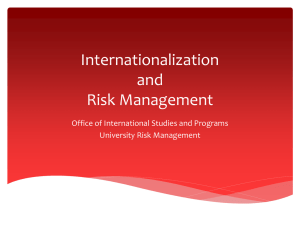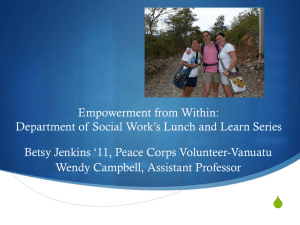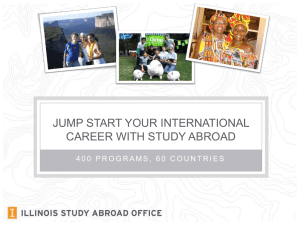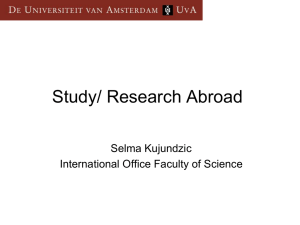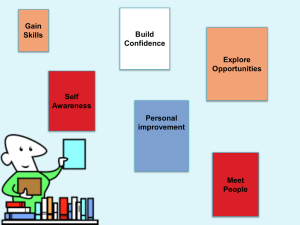InternationalCareers Lecturette
advertisement
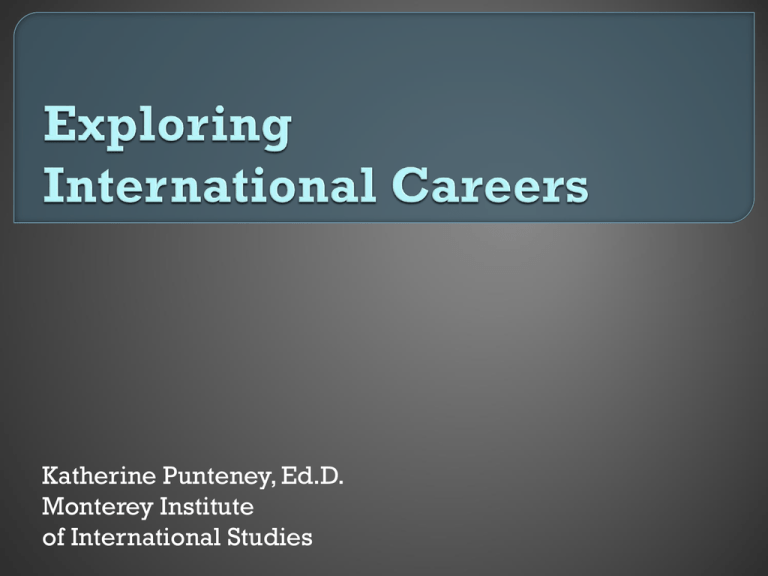
Katherine Punteney, Ed.D. Monterey Institute of International Studies This lecturette was created by Katherine Punteney as part of a module on exploring international careers designed to be presented to undergraduates in international education courses. Research on the effectiveness of this module has been published: Punteney, K. (2012). Journal of Studies in International Education, 16(4). 390-407. doi: 10.1177/1028315311430354 Contact info: Katherine Punteney, Ed.D. Program Chair, MA in International Education Management Monterey Institute of International Studies 460 Pierce Street, Monterey, CA 93940 kpunteney@miis.edu Feel free to edit, modify, and use this presentation for non-profit, educational purposes. I’ve taken out all of my photos, please add your own. If your modified version resembles this one, please give acknowledgement on one of the slides to: Katherine Punteney, Ed.D. Program Chair, MA in International Education Management Monterey Institute of International Studies If your version is dramatically modified and this was merely food for thought, then no acknowledgement required. I’d love to hear about anything you do with this: kpunteney@miis.edu A series of related jobs that take place in one or more countries outside the United States, or within the United States but with a substantial international focus. University of Puget Sound, Pac-Rim Program Mukogawa Fort Wright Institute Spokane, Washington Mukogawa Women’s University Junior High & High School Nishinomiya, Japan SIT Graduate Institute, Brattleboro, VT MA in International Education Sangam World Center, World Association of Girl Guides and Girl Scouts; Pune, India Tasks unique to global careers… Work with colleagues from other countries Interact with external clients from other countries Interact with internal clients from other countries May need to speak a language other than their mother tongue Supervise employees who are of different nationalities Develop strategic business plans on a worldwide basis for their unit or organization Manage a budget on a worldwide basis for their unit or organization Negotiate in other countries or with people from other countries Manage foreign suppliers or vendors Manage risk on a worldwide basis for their unit or organization (Caligiuri, 2006) ACE Survey of 1500+ college-bound high school students: • 55% were certain or fairly certain they will participate in study abroad • 35% planned to participate in an international internship. • 37 % were very interested in acquiring career- related work experience in another country. (American Council on Education, 2008) The American Council on Education gathered data in 2006 from 1,052 U.S. institutions: “Does your institution’s mission statement specifically refer to international or global education?” Yes: • Doctorate-granting (59%) • Master’s (53%) • Baccalaureate (43%) • Associate’s (27%) • Total (39%) “To assist students… to be useful members of a global society” (American Council on Education, 2008) Knowledge, skills, and attitudes of a professional with a global mindset… Values diversity and is able to leverage differences in a meaningful way Understands and recognizes complex patterns in complex environments Instills values and inspires others Builds and maintains organizational networks at a global level Extends their personal space beyond their immediate geography in real terms as well as in relationships with others. Makes emotional connections Has a capacity for managing uncertainty Balances tensions of global integration and local responsiveness Mobilizes worldwide resources to capture market opportunities Uses technology, information systems, and telecommunications (Kedia & Mukherji, 1999) American Council on Education (Green & Shoenberg, 2006) A globally competent student graduating from our institution… Knowledge Skills Attitudes Recognizes own culture as one of many diverse cultures Uses knowledge, diverse frames of reference, and alternative perspectives to think critically and solve problems Appreciates the language, art, religion, philosophy, and material culture of different cultures. Demonstrates knowledge of global issues, processes, trends, and systems Communicates and connects with people in other language communities in a range of settings for a variety of purposes Accepts cultural differences and tolerates cultural ambiguity Demonstrates knowledge of other cultures including beliefs, values, perspectives, practices, and products Uses foreign language skills and/or knowledge of other cultures to extend own access to information, experiences, and understanding Demonstrates an ongoing willingness to seek out international or intercultural opportunities. “The prevailing wisdom of the late 20th century was that organizations could build loyal workforces socialized in organizational careers. Under this model, global careers were limited largely to expatriate assignments, conceptualized as international segments of organizational careers.” “Destabilization of careers in the restructuring of the 1980s and 1990s caused a major revision of the organizational careers view. Careers appeared increasingly to be under the control of the individual rather than the organization, and became boundaryless, meaning that they crossed traditional organizational boundaries.” (Carr, Inkson, & Thorn, 2005) The nature of global work is shifting away from a model of hierarchy, efficiency, and centralized control to a model of teamwork, partnership, and decentralization. (Kedia & Mukherji, 1999) It is no longer just the largest multinational corporations that are global in scope, instead even small and medium organizations are likely to have some combination of foreign suppliers, partners, employees, shareholders, or customers. (Caligiuri, 2006) Organizations are increasingly using other methods of meeting workforce needs such as short-term assignments, localized transfer, international commuting, and extended business travel. (Cappellen and Janssens, 2005) The boundaryless global career is described as: • Movement across boundaries • • • • • of separate nations Drawing validation from outside the present nation Sustained by international networks or information Breaking traditional national career boundaries Rejection of national career opportunities for personal or family reasons Perceiving a boundaryless future regardless of geographical constraints (Carr, Inkson, & Thorn, 2005) Surveys of 3700+ students from 500+colleges who had studied abroad from 1950-1999: 17% participated in internship or field experience abroad, of those 63% agreed that it “assisted or influenced my career” 62% agreed that the study abroad experience “ignited interest in a career direction pursued” 65% agreed that study abroad experience “enhanced ability to speak foreign language used in the workplace” 49% agreed “provided me with an internship experience that shaped my career path” 17% agreed “Influenced me to get a job overseas” (Norris & Gillespie, 2002) Of all respondents, 48% reported working or volunteering in a globally oriented position at some point since college. • Types of positions: private industry (21%), education (14%), NGO employee (8%), NGO volunteer (8%), U.S. government employee (5%), Consultant (4%), other government employee (2%), other (6%) Comparing study abroad participants in the 50s and 60s, to those in the 90s, the ones in the 90s were: • Almost two times as likely to have been influenced to get a job overseas • Three times more likely to have worked for a MNC • Twice as likely to have worked in a private industry with an international component • Ten times more likely to have participated in an internship while studying abroad (Norris & Gillespie, 2002) The characteristics of study-abroad programs that seem to lead to global work are: • language of instruction other than English (62% more likely) • longer programs (full year programs 40% more likely) • taking host university courses (24% more likely) • participating in internship while abroad (20% more likely) • more likely if they lived with host family (Norris & Gillespie, 2002) Interviews with 48 American expatriates working in 38 for-profit companies in Hong Kong, Taipei, Beijing, Tokyo, and Seoul. Top ten strategies were: 1. Obtain work at MNC at company HQ 2. Study abroad in U.S. based program 3. Study foreign language 4. Move to foreign country of choice and actively seek employment 5. Engage in international travel 6. Obtain international internship 7. Find international business mentor 8. Study in an international business/relations major 9. Study abroad in foreign based program 10. Teach English abroad Note: Those interviewed discouraged international non-profit work as a way to get into international business Three predicted outcomes were not found: Working in U.S. in international trade, regular international correspondence, U.S. based travel and tourism employment. (Vance , 2005) Taxonomy of self-initiating career paths: (Vance, 2005) (Vance, 2005) Get a job with a U.S. company or organization that does overseas work Get a job with a foreign company or organization that works in the U.S. Get an internship abroad Volunteer abroad Do freelance work Teach English abroad Network with alumni Go abroad and get whatever work you can find (teaching, restaurant, etc.) US Agency for International Development • Agricultural/rural development • Contract/commodity managers • Democracy officers • Education officers • Human resource officers • Environment/natural resources • Financial managers • Health/population/nutrition officers • Housing/urban development • Private enterprise officers Foreign Service/Department of State • Tracks: Political, Economic, Administrative, Consular, Public diplomacy Public Diplomacy & Public Affairs/DOS (formerly US Information Agency) International Broadcasting Bureau (including former Voice of America) Export-Import Bank of US US Dept of Commerce • Office of Market Access and Compliance • Office of Trade Development • Office of Import Administration • Bureau of Export Administration • Foreign Commercial Service • Office of the Deputy Assistant for Tourism • Economics and Statistics Administration • National Telecommunications and Information Administration/Office of International Affairs • National Oceanic and Atmospheric Administration (NOAA) US Dept of Agriculture • Foreign Agriculture Service US Dept of Energy • Office of Policy and International Affairs US Dept of Health and Human Services • Office of Refugee Resettlement US Dept of Justice • Office of International Affairs National Science Foundation • Division of International Programs US Dept of Labor • Bureau of International Labor Affairs US Dept of Transportation • Maritime Administration • Federal Aviation Administration Environmental Protection Agency (EPA) US Dept of Justice • Office of International Affairs • Drug Enforcement Administration (DEA) Office of the US Trade Representative US Trade Commission Federal Reserve System Overseas Private Investment Corporation Inter-American Foundation Peace Corps National Aeronautics and Space Administration Library of Congress Central Intelligence Agency (CIA) Defense Intelligence Agency National Security Agency (NSA) Department of Defense (DOD) • International Security Affairs Division Department of Homeland Security (DHS) • US Citizenship and Immigration Service • Immigration and Customs Enforcement • Customs and Border Protection Federal Bureau of Investigation (FBI) United Nations Secretariat Departments (NYC & Geneva) • Peacekeeping Operations • Economic and Social Affairs • Disarmament Affairs • Political Affairs • Public Information • Coordination of Humanitarian Assistance • Positions related to political analysis, economics, social and humanitarian work, management and finance, public relations, information technology UN Children’s Fund (UNICEF) UN Conference on Trade and Development UN Development Program (UNDP) UN Development Fund for Women UN Volunteers UN Environment Programme UN High Commission for Refugees UN Institute for Training and Research UN Educational, Scientific, and Cultural Organization (UNESCO) UN Fund for Population Activities World Food Programme Int’l Fund for Agricultural Development International Labour Organization UN Industrial Development Organization World Health Organization International Atomic Energy Agency World Bank International Monetary Fund World Trade Organization Asian Development Bank Major US Multinational Corporations: Berkshire Hathaway Boeing Chevron Texaco ExxonMobil General Electric IBM Johnson & Johnson Major US Multinational Corporations: Merck Microsoft Pfizer Philip Morris Companies Procter & Gamble SBC Communications Wal-Mart Stores Major Non-US Multinational Corporations: British Petroleum Daimler Chrysler Royal Dutch/Shell Group Toyota Motor Mitsubishi Mitsui & Co. Total Fina Elf Nippon Telephone & Telegraph Major Non-US Multinational Corporations: Itochu Allianz Worldwide ING Group Volkswagon Group Siemens Group Sumitomo Marubeni Major Consulting Firms: A.T. Kearney Inc Bain & Company Booz Allen Hamilton Boston Consulting Group McKinsey and Company The Monitor Group Accenture PricewaterhouseCoopers Deloitte & Touche Consulting Cap Gemeni Earnst & Young Bearing Point Research and Think Tanks: The Brookings Institution Carnegie Council on Ethics and International Affairs Carnegie Endowment for International Peace Center for Strategic and International Studies Council on Foreign Relations East-West Institute Institute for International Economics International Center for Research on Women International Development Research Center Social Science Research Council Worldwatch Institute Region Specific Organizations: American Council on Germany American Jewish Committee Asia Foundation China Institute in America Council of the Americas Middle East Institute Near East Foundation Operations Crossroads America International Development Organizations: American Friends Service Committee Catholic Relief Services Center for Development and Population Activities Institute for Sustainable Communities Childreach Food First InterAction Oxfam-America Save the Children Trickle Up Program Environment, Energy, and Population: Conservation International Environmental Defense Family Care International Greenpeace International Institute for Sustainable Development International Planned Parenthood Federation Nature Conservancy Population Council Rainforest Alliance Sierra Club World Wildlife Fund Relief, Refugee Assistance, Human Rights: Amnesty International Bread for the World Center for Independent Living Freedom from Hunger Foundation Human Rights Watch International Federation of Red Cross and Red Crescent Societies International Rescue Committee Refugees International World Concern Wire Services: • Agence France-Presse, Associated Press, Bloomberg, Reuters, United Press International Newspapers: • Boston Globe, Christian Science Monitor, Economist Group, Financial Times Group, International Herald Tribune, Knight Ridder Digital, LA Times, New York Times Magazines/Journals: • National Geographic, Forbes, Foreign Affairs, Foreign Policy, Newsweek, Time, Wall Street Journal, Washington Post, US News & World Report Broadcasting: • ABC, BBC World Service, CNN, CBS, Corporation for Public Broadcasting, Fox News, NBC, CNBC, NPR Online Media: • Slate, News.com, Ananova Advertising: • J. Walter Thompson Company, BBDO Worldwide, Bozwell Worldwide, Ogilvy & Mather, Saatchi & Saatchi Public Relations: • Burson-Marsteller, Edelman, Hill and Knowlton, Ruder Finn Teaching Abroad: Overseas American Schools European Council of International Schools International School Services Peace Corps WorldTeach Volunteers in Asia Japan Exchange and Teaching Progam (JET) Others: see Dave’s ESL Café, NOVA group, AEON Corporation, TESOL Placement Service Educational Development/Cultural Exchange: American Council on Education American-Mideast Educational and Training Services (AMIDEAST) American Field Service Council on International Educational Exchange Experiment in International Living Institute of International Education IREX Sister Cities International World Education Global Health Organizations: Beresford Blake Thomas CANADEM Helen Ziegler and Associates International Health Exchange International Hospital Recruitments Doctors without Borders Project Concern International Trillium Human Services International Red Cross Links to career center and international education office resource lists: “It will become normal to live in other countries for periods of time, and to travel between them in careers that are cumulative and cosmopolitan. Talent will flow regularly between countries.” “Individuals may be able to retain a sense of national identity, but more and more will become dual or multiple citizens, or even conceptualize themselves as citizens of the world, with careers that are not just international, but truly global.” (Carr, Inkson, & Thorn, 2005) American Council on Education. (2008, January). College-bound students’ interests in study abroad and other international learning activities. Accessed 10/5/2009 from http://www.acenet.edu/AM/Template.cfm?Section=Home&Template=/CM/Conten tDisplay.cfm&ContentFileID=3997 American Council on Education. (2008). Mapping Internationalization on U.S. Campuses. Washington D.C.: Author. Caligiuri, P. (2006). Developing global leaders. Human Resource Management Review, 16. 219-228. Cappellen, T. & Janssens, M. (2005). Career paths of global managers: Towards future research. Journal of World Business, 40. 348-360. Carr, S.C., Inkson, K., & Thorn, K. (2005). From global careers to talent flow: Reinterpreting ‘brain drain’. Journal of World Business 40, 386-398. Green, M.& Shoenberg, R. (2006). Where Faculty Live: Internationalizing the Disciplines. Washington, D.C.: American Council on Education. Hachey, J. (2007). The big guide to living and working overseas (4th ed., 2nd printing). Toronto: Intercultural Systems. Kedia, B. & Mukherji, A. (1999). Global managers: Developing a mindset for global competitiveness. Journal of World Business, 34(3). 230-251. Norris, E.M. & Gillespie, J. (2009). How study abroad shapes global careers: Evidence from the United States. Journal of Studies in International Education 13(3). 382-397. Segal, N. & Kocher, E. (2003). International jobs: Where they are, how to get them (6th ed.). New York: Basic Books. Vance, C.M. (2005). The personal quest for building global competence: A taxonomy of self-initiating career path strategies for gaining business experience abroad. Journal of World Business 40. 374-385.

